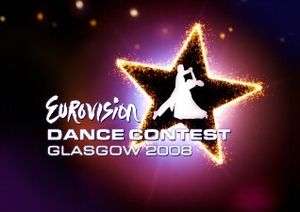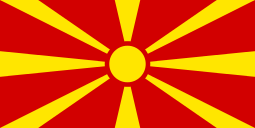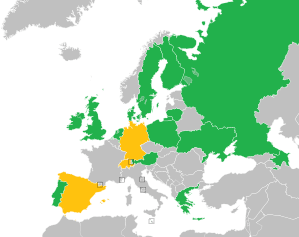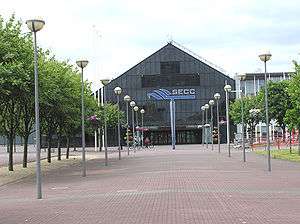Eurovision Dance Contest 2008
| Eurovision Dance Contest 2008 | ||||
|---|---|---|---|---|
 | ||||
| Dates | ||||
| Final | 6 September 2008 | |||
| Host | ||||
| Venue | SECC,[1] Glasgow, Scotland, United Kingdom | |||
| Presenter(s) | [2] | |||
| Director | Nikki Parsons | |||
| Executive supervisor | Tal Barnea | |||
| Executive producer | Alan Tyler | |||
| Host broadcaster | BBC Scotland (BBC)[2] | |||
| Interval act | Lesley Garrett and "Carousel" cast, performing medley of "June Is Busting Out All Over" and "You'll Never Walk Alone"[1] | |||
| Participants | ||||
| Number of entries | 14 | |||
| Debuting countries | | |||
| Returning countries | None | |||
| Withdrawing countries |
| |||
| Participation map
| ||||
| Vote | ||||
| Voting system | Each country awards 1–8, 10, and 12 points to their 10 favourite acts, plus additional panel of experts awards maximum of 48 points to their favourites.[1] | |||
| Nul points | None | |||
| Winning dancers | Edyta Herbuś & Marcin Mroczek | |||
| Eurovision Dance Contest | ||||
| ||||
The Eurovision Dance Contest 2008 was the second Eurovision Dance Contest and was held in Glasgow, Scotland, United Kingdom, hosted by BBC Scotland on 6 September.[3]
The winner of contest was Poland who achieved a score of 154 points. 2nd place went to Russia, 3rd place to Ukraine, 4th place to Lithuania and 5th place to Azerbaijan who were participating for the first time.
In a change to the rules, professional couples were no longer eligible to enter the contest. At least one dancer from each couple had to be a local celebrity, not professionally trained to dance.[1] A further change was that each couple only performed once. In 2007 each couple performed a ballroom or Latin routine followed by a freestyle dance incorporating national flavour; in the 2008 contest, couples only performed the latter.[1] In 2008 a panel of experts was introduced with an approximate weight of 23% of the total outcome and the rest 77% determined through televoting. The highest possible points from the jury were 48 while the televoting cast a maximum of 156 points.[1]
Location
The Scottish Exhibition and Conference Centre (SECC) is Scotland's largest exhibition centre, located in the district of Finnieston on the north bank of the River Clyde, Glasgow. The venue's holding company SEC Limited, is 91% owned by Glasgow City Council and 9% owned by private investors. It is probably best known for hosting concerts, particularly in Hall 4 and Hall 3.
Since the opening of the original buildings in 1985, the complex has undergone two major expansions; the first being the Clyde Auditorium in 1997, and then the SSE Hydro Arena in 2013.
Participants
According to the 2007 rules Section 2.2[4] on the official website, all entrants in the Eurovision Dance Contest 2007 agreed to take part in 2008 when signing up for the first contest. However, Switzerland and Germany announced their withdrawals from 2008 edition of the contest due to low ratings and poor results in 2007.[1]
The Spanish broadcaster announced its withdrawal on 20 August, just days before the contest took place. In July they held a national selection show Quiero Bailar and named singer Rosa López and dancer Nieto as their representatives in the contest. According to the draw they were supposed to be 15th couple to perform.[5]
As the number of dances was reduced, with each couple performing once instead of twice, new countries were allowed to enter the competition, but the only new country to enter the contest was Azerbaijan.[1]
Among the countries that broadcast the event without sending representatives were: Albania, Armenia, Belarus, Bosnia and Herzegovina, Cyprus, Macedonia, Iceland, Israel, Malta and Spain.[1] Australia also broadcast the contest on 6 May 2009, as a lead up to the Eurovision Song Contest 2009, on SBS.[6] This was the first time Australia has ever broadcast the Eurovision Dance Contest, after failing to broadcast the Eurovision Dance Contest 2007, and was aired without any commentary.
Controversy
Azerbaijan and Greece announced professional dance couples as their representatives at the Eurovision Dance Contest 2008. According to the regulations of the contest,[7] professional couples were not allowed to take part in the competition. The EBU specified that the couple had to be composed of one professional (defined as a dancer who earns his or her living through dance and dance-related activities), and one non-professional known in a field other than dance. The non-professional was not required to be a celebrity, as long as he or she was known in his field, and it was also not a requirement that the non-professional had no dance experience. Since the representatives for Azerbaijan and Greece both consisted of two professional dancers, however, it is not clear why their entries were considered valid.
Participating countries
| Draw | Country | Competing dancers | Dance styles | Rank | Points |
|---|---|---|---|---|---|
| 01 | |
Danny Saucedo & Jeanette Carlsson[8] | Cha-Cha | 12 | 38 |
| 02 | |
Dorian Steidl & Nicole Kuntner[9] | Slowfox/Jive/Hip-Hop | 13 | 29 |
| 03 | |
Patrick Spiegelberg & Katja Svensson[10] | Samba/Tango/Paso Doble/Jazz Dance | 6 | 102 |
| 04 | |
Eldar Dzhafarov & Anna Sazhina[11] | Paso Doble/Rumba/Tango/Azeri Folk Dance | 5 | 106 |
| 05 | |
Gavin Ó Fearraigh & Dearbhla Lennon[12] | Paso Doble/Rumba/Hard Shoe Irish Dance | 11 | 40 |
| 06 | |
Maria Lund & Mikko Ahti[13] | Tango | 10 | 44 |
| 07 | |
Thomas Berge & Roemjana De Haan[14] | Rumba/Show Dance | 14 | 1 |
| 08 | |
Karina Krysko & Saulius Skambinas[15] | Rumba/Cha-Cha/Acrobatic Elements | 4 | 110 |
| 09 | |
Louisa Lytton & Vincent Simone[16] | Paso Doble/Jive/Tango | 9 | 47 |
| 10 | |
Tatiana Navka & Alexander Litvinenko[17] | Cha-Cha/Samba/Rumba/Paso Doble/Russian Folk Dance | 2 | 121 |
| 11 | |
Jason Roditis & Tonia Kosovich[18] | Latin dances | 7 | 72 |
| 12 | |
Raquel Tavares & João Tiago[19] | Rumba/Tango | 8 | 61 |
| 13 | |
Edyta Herbuś & Marcin Mroczek[20] | Rumba/Cha-Cha/Jazz Dance | 1 | 154 |
| 14 | |
Lilia Podkopayeva & Sergey Kostetskiy[21] | Jive/Ukrainian Folk Dance/Rock'n'Roll | 3 | 119 |
Scoreboard
It is worth noting that, had the judges not been introduced (and thus only the televote been used), Poland would still have won the competition by 31 points.
| Voters | |||||||||||||||||
|---|---|---|---|---|---|---|---|---|---|---|---|---|---|---|---|---|---|
| Jury | |||||||||||||||||
| |
Sweden | 4 | X | 3 | 10 | 0 | 0 | 7 | 0 | 1 | 2 | 2 | 2 | 3 | 4 | 0 | |
| Austria | 0 | 0 | X | 3 | 2 | 1 | 3 | 0 | 4 | 5 | 4 | 5 | 1 | 0 | 1 | ||
| Denmark | 48 | 8 | 7 | X | 1 | 3 | 8 | 2 | 6 | 4 | 0 | 1 | 7 | 2 | 5 | ||
| Azerbaijan | 28 | 5 | 8 | 0 | X | 7 | 1 | 4 | 12 | 1 | 10 | 6 | 4 | 12 | 8 | ||
| Ireland | 0 | 0 | 0 | 4 | 6 | X | 2 | 0 | 5 | 8 | 7 | 0 | 0 | 6 | 2 | ||
| Finland | 12 | 12 | 0 | 6 | 5 | 0 | X | 1 | 3 | 0 | 0 | 0 | 2 | 3 | 0 | ||
| Netherlands | 0 | 0 | 1 | 0 | 0 | 0 | 0 | X | 0 | 0 | 0 | 0 | 0 | 0 | 0 | ||
| Lithuania | 32 | 7 | 0 | 7 | 4 | 10 | 6 | 5 | X | 10 | 5 | 4 | 5 | 8 | 7 | ||
| United Kingdom | 8 | 1 | 4 | 5 | 3 | 8 | 0 | 10 | 0 | X | 1 | 3 | 0 | 1 | 3 | ||
| Russia | 24 | 6 | 6 | 2 | 8 | 4 | 12 | 8 | 10 | 0 | X | 12 | 10 | 7 | 12 | ||
| Greece | 40 | 4 | 2 | 0 | 0 | 2 | 5 | 3 | 0 | 3 | 3 | X | 6 | 0 | 4 | ||
| Portugal | 0 | 3 | 5 | 1 | 7 | 6 | 0 | 6 | 2 | 7 | 6 | 7 | X | 5 | 6 | ||
| Poland | 20 | 10 | 12 | 12 | 10 | 12 | 10 | 12 | 8 | 12 | 8 | 10 | 8 | X | 10 | ||
| Ukraine | 16 | 2 | 10 | 8 | 12 | 5 | 4 | 7 | 7 | 6 | 12 | 8 | 12 | 10 | X | ||
12 points
The maximum twelve points awarded by each country (to the couple who had received the most phone votes) were allocated as follows:
| N. | Contestant | Nation(s) giving 12 points |
|---|---|---|
| 5 | Poland | Austria, Denmark, Ireland, The Netherlands, United Kingdom |
| 3 | Russia | Finland, Greece, Ukraine |
| Ukraine | Azerbaijan, Portugal, Russia | |
| 2 | Azerbaijan | Lithuania, Poland |
| 1 | Finland | Sweden |
Results without the jury
- 1st
 Poland - 134
Poland - 134 - 2nd
 Ukraine - 103
Ukraine - 103 - 3rd
 Russia - 97
Russia - 97 - 4th
 Azerbaijan - 78
Azerbaijan - 78 - 4th
 Lithuania - 78
Lithuania - 78 - 6th
 Portugal - 61
Portugal - 61 - 7th
 Denmark - 54
Denmark - 54 - 8th
 Ireland- 40
Ireland- 40 - 9th
 United Kingdom - 39
United Kingdom - 39 - 10th
 Sweden - 34
Sweden - 34 - 11th
 Finland - 32
Finland - 32 - 11th
 Greece - 32
Greece - 32 - 13th
 Austria - 29
Austria - 29 - 14th
 Netherlands - 1
Netherlands - 1
International broadcasts and voting
Voting and spokespersons
The order in which each country announced their votes was done in order of performance. The spokespersons are shown alongside each country.
-
 Sweden – Carin Da Silva
Sweden – Carin Da Silva -
 Austria – Marvin Wolf
Austria – Marvin Wolf -
 Denmark – Jens Blauenweldt
Denmark – Jens Blauenweldt -
 Azerbaijan – Husniye Maharramova
Azerbaijan – Husniye Maharramova -
 Ireland – Brian Osmond
Ireland – Brian Osmond -
 Finland – Jaana Pelkonen
Finland – Jaana Pelkonen
(Presenter of Eurovision Song Contest 2007) -
 Netherlands – Marcus van Teylingen
Netherlands – Marcus van Teylingen -
 Lithuania – Audrius Girzadas
Lithuania – Audrius Girzadas -
 United Kingdom – Carol Smillie
United Kingdom – Carol Smillie -
 Russia – Larisa Verbitskaya
Russia – Larisa Verbitskaya -
 Greece – Rika Vagianni
Greece – Rika Vagianni -
 Portugal – Helena Coelho
Portugal – Helena Coelho -
 Poland – Anna Popek
Poland – Anna Popek -
 Ukraine – Yuliya Okropiridze
Ukraine – Yuliya Okropiridze
Commentators
-
 Sweden – David Hellenius and Tony Irving (TV4)
Sweden – David Hellenius and Tony Irving (TV4) -
 Austria – Andi Knoll and Nicole Burns-Hansen (ORF 2)[1]
Austria – Andi Knoll and Nicole Burns-Hansen (ORF 2)[1] -
 Denmark – Nicolaj Molbech and Jørgen de Mylius (DR1)
Denmark – Nicolaj Molbech and Jørgen de Mylius (DR1) -
 Azerbaijan – Leyla Aliyeva and Murad Ragimov (Ictimai TV)[22]
Azerbaijan – Leyla Aliyeva and Murad Ragimov (Ictimai TV)[22] -
 Ireland – Michael Flatley (RTÉ One)
Ireland – Michael Flatley (RTÉ One) -
 Finland – Sirpa Suutari-Jääskö and Johanna Pirttilahti (Yle TV2)[23]
Finland – Sirpa Suutari-Jääskö and Johanna Pirttilahti (Yle TV2)[23] -
 Netherlands – Lucille Wener and Cor van de Stroet (Nederland 1)[24]
Netherlands – Lucille Wener and Cor van de Stroet (Nederland 1)[24] -
 Lithuania – Asta Einikyte and Virginijus Visockas (LRT/LTV)[1]
Lithuania – Asta Einikyte and Virginijus Visockas (LRT/LTV)[1] -
 United Kingdom – Len Goodman and Craig Revel Horwood (BBC One)[1]
United Kingdom – Len Goodman and Craig Revel Horwood (BBC One)[1] -
 Russia – Yana Churikova and Stanislav Popov (Channel One)[1]
Russia – Yana Churikova and Stanislav Popov (Channel One)[1] -
 Greece – Fotis Sergoulopoulos (NET)
Greece – Fotis Sergoulopoulos (NET) -
 Portugal – Isabel Angelino and Alberto Rodrigues (RTP1, RTP Internacional, RTP Africa)
Portugal – Isabel Angelino and Alberto Rodrigues (RTP1, RTP Internacional, RTP Africa) -
 Poland – Artur Orzech and Zbigniew Zasada (TVP2)
Poland – Artur Orzech and Zbigniew Zasada (TVP2) -
 Ukraine – Timur Miroshnychenko and Miroslav Keba (Pershyi Natsionalnyi)[1]
Ukraine – Timur Miroshnychenko and Miroslav Keba (Pershyi Natsionalnyi)[1]
Non-participating countries
-
 Albania – Leon Menkshi (RTSH)
Albania – Leon Menkshi (RTSH) -
 Armenia – Felix Khacatryan and Hrachuhi Utmazyan (ARMTV)
Armenia – Felix Khacatryan and Hrachuhi Utmazyan (ARMTV) -
 Belarus – Denis Kurian and Tatiana Bondarchuck (Belarus-1)[1]
Belarus – Denis Kurian and Tatiana Bondarchuck (Belarus-1)[1] -
 Bosnia and Herzegovina – Dejan Kukrić (BHT 1)
Bosnia and Herzegovina – Dejan Kukrić (BHT 1) -
 Cyprus – Melina Karageorgiou (RIK 2)
Cyprus – Melina Karageorgiou (RIK 2) -
 Iceland – Eva María Jónsdótttir (RÚV)[1]
Iceland – Eva María Jónsdótttir (RÚV)[1] -
 Israel – No commentator (Channel 1)
Israel – No commentator (Channel 1) -
 Macedonia – Milanka Rasic (MKRTV)[1]
Macedonia – Milanka Rasic (MKRTV)[1] -
 Malta – Eileen Montesin (TVM)[1]
Malta – Eileen Montesin (TVM)[1] -
 Spain – Sandra Daviú (TVE2)[1]
Spain – Sandra Daviú (TVE2)[1]
See also
References
- 1 2 3 4 5 6 7 8 9 10 11 12 13 14 15 16 17 18 19 "Eurovision Dance Contest 2008 information page". ESCKaz.com.
- 1 2 "The Eurovision Dance Contest Glides Into Glasgow". BBC Press office.
- ↑ Eurovision... So much more!
- ↑ http://www.eurovisiondance.tv/rules.pdf
- ↑ "Spain at Eurovision Dance Contest 2008". ESCKaz.com.
- ↑ "SBS Schedule 13 May 2009". SBS.
- ↑ Rules | Eurovision Dance Contest - Glasgow 2008
- ↑ "Sweden at Eurovision Dance Contest 2008". ESCKaz.com.
- ↑ "Austria at Eurovision Dance Contest 2008". ESCKaz.com.
- ↑ "Denmark at Eurovision Dance Contest 2008". ESCKaz.com.
- ↑ "Azerbaijan at Eurovision Dance Contest 2008". ESCKaz.com.
- ↑ "Ireland at Eurovision Dance Contest 2008". ESCKaz.com.
- ↑ "Finland at Eurovision Dance Contest 2008". ESCKaz.com.
- ↑ "The Netherlands at Eurovision Dance Contest 2008". ESCKaz.com.
- ↑ "Lithuania at Eurovision Dance Contest 2008". ESCKaz.com.
- ↑ "UK at Eurovision Dance Contest 2008". ESCKaz.com.
- ↑ "Russia at Eurovision Dance Contest 2008". ESCKaz.com.
- ↑ "Greece at Eurovision Dance Contest 2008". ESCKaz.com.
- ↑ "Portugal at Eurovision Dance Contest 2008". ESCKaz.com.
- ↑ "Poland at Eurovision Dance Contest 2008". ESCKaz.com.
- ↑ "Ukraine at Eurovision Dance Contest 2008". ESCKaz.com.
- ↑ http://esckaz.com/edc/2008/aze.htm
- ↑ http://www.telvis.fi/tvohjelmat/?vw=channel&ch=tv2&sh=all&dy=06.09.2008
- ↑ http://www.dansschoolvandestroet.nl/archief.htm


